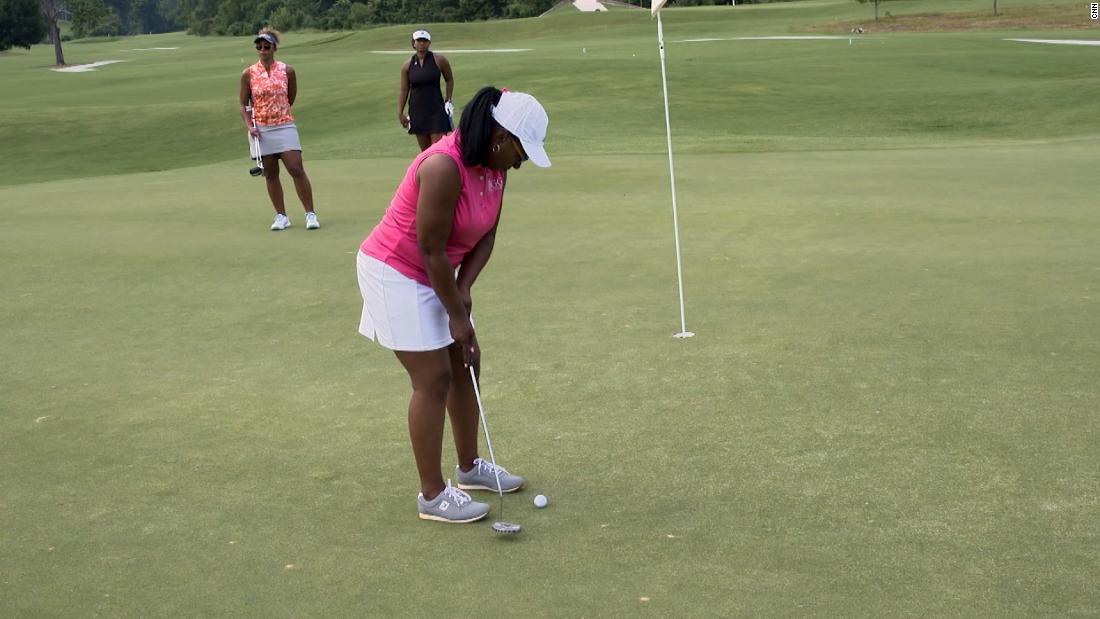Like many young professionals, Tiffany Fitzgerald followed the advice to go to college and get a good job. But no one told her that she would also have to learn to play golf to get promoted in the company.
“Once I entered the corporate world, I quickly discovered that golf was the only thing that others did that I did not do, and that is why I learned to play,” she says.
For Fitzgerald, it wasn’t exactly love at first hit. The steep learning curve was “embarrassing and intimidating”. But once she got better, she enjoyed herself more, so much so that she made golf her full-time career.
In 2013, Fitzgerald founded Black Girls Golf to create a safe space for women and girls to learn, play and connect at all skill levels. She says participation “skyrocketed” in the pandemic as more people sought safer activities to enjoy outdoors.
The Atlanta-based organization now has more than 4,000 members in delegations across the United States, a sign of the growing inclusion in a sport traditionally dominated by wealthy white men.
“Black women make up less than one percent of the golf industry workforce, so a big part of our mission is to introduce girls to the professional opportunities that golf offers. And for professional women, there are many benefits, including health and wellness,” says Fitzgerald.
A longer and healthier life
A 2009 Swedish study suggests that golfers can live longer than non-golfers, up to five years longer. Playing at least once a month can also reduce the risk of premature death in older adults.
According to Dr. Jacquelyn Turner, an adjunct professor at Morehouse School of Medicine, routinely playing golf has several physical health benefits. She is a golfer herself and says that playing golf can burn up to 2,000 calories by walking 18 holes, the equivalent of five miles, depending on the course.
Burning that many calories “is great aerobic exercise that can reduce many comorbidities such as diabetes, hypertension and high cholesterol,” says Dr. Turner.
She also points out other benefits of golf, such as increasing HDL (“good” cholesterol) levels and strengthening the abdominal muscles, which are especially important in preventing falls in the future. Being outside in the sun also helps with vitamin D exposure.
And playing golf can make you a better candidate for surgery if you need it. As a colorectal surgeon, Dr. Turner has to assess the health of patients before scheduling operations. “If I know that a patient has been to the golf course and walks 18 holes of golf, guess what? They probably have a good indication of a healthy heart and lung system,” she says.
Beyond the physical benefits
As a busy, working mom, Fitzgerald sees golf as a healthy way to unwind and relax in the great outdoors.
“For me, it has been a great stress reliever, helping my mental health a lot,” says Fitzgerald. “You forget what happens on a day-to-day basis because most golf courses are very beautiful. And nature can sometimes be really serene, and it helps you calm down and reduce your stress levels.”
Fitzgerald says that golf also teaches important skills that carry over into everyday life, such as discipline and self-acceptance. “There are a lot of parallels to golf in life, you know, hitting a bad shot and being able to let it go,” adds Fitzgerald.
“Golf forces you to forgive yourself, to be patient and, of course, to focus on the task at hand.”
Playing golf releases hormones that reduce stress and anxiety and can also improve memory, according to Dr. Turner. Research suggests that the social nature of the sport may also contribute to golfers’ increased longevity.
As Fitzgerald can attest, golf can also boost your career. “Golf can put you in situations where you would never meet and side with people you would never have met,” she says, adding that networking on the field could lead to future career opportunities outside the field.
A sport for life
Golf is a low-impact, joint-friendly sport that can be played at any age.
“It’s more about mental stamina, finesse and skill than strength, so you can play golf for a lifetime,” says Fitzgerald.
Dr. Turner agrees. “Golf is a good activity for all segments of the population, from children to the elderly,” adding that everyone can benefit from improved balance and eye coordination. But before playing, she advises consulting your doctor, especially if you have previous medical problems, such as cardiovascular disease.
Once you are medically cleared, Fitzgerald recommends looking for other people to play. Not only will you be more responsible, but you will also find a community to have fun with, something important to a long and healthy life.

